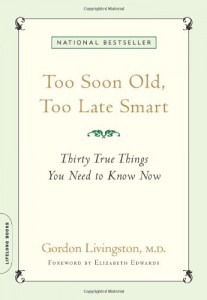by Gordon Livingston. 2004.
Contents
- If the map doesn’t agree with the ground, the map is wrong
- We are what we do
- It is difficult to remove by logic an idea not placed there by logic in the first place
- The statute of limitations has expired on most of our childhood traumas
- Any relationships is under the control of the person who cares the least
- Feelings follow behavior
- Be bold, and mighty forces will come to your aid
- The perfect is the enemy of the good
- Life’s two most important questions are “Why?” and “Why not?” The trick is knowing which one to ask
- Our greatest strengths are our greatest weaknesses
- The most secure prisons are those we construct for ourselves
- The problems of the elderly are frequently serious but seldom interesting
- Happiness is the ultimate risk
- True love is the apple of Eden
- Only bad things happen quickly
- No all who wander are lost
- Unrequited love is painful but not romantic
- There is nothing more pointless, or common, than doing the same things and expecting different results
- We flee from the truth in vain
- It’s a poor idea to lie to oneself
- We are all prone to the myth of the perfect stranger
- Love is never lost, not even in death
- Nobody likes to be told what to do
- The major advantage of illness is that it provides relief from responsibility
- We are afraid of the wrong things
- Parents have a limited ability to shape children’s behavior, except for the worse
- The only real paradises are those we have lost
- Of all the forms of courage, the ability to laugh is the most profoundly therapeutic
- Mental health requires freedom of choice
- Forgiveness is a form of letting go, but they are not the same thing
Chapter 1: If the map doesn’t agree with the ground, the map is wrong
I have learned that our passage through life consists of an effort to get the maps in our head to conform to the ground on which we walk.
To single out an important life task about which most of us could use some instruction, we might look at choosing (and keeping) a mate. The fact that upward of half of all marriages end in divorce indicates that collectively we are not very good at this task.
So what is it exactly that we need to know to decide if someone is a suitable candidate for a lifetime commitment? Perhaps ones way to approach this screening process is to learn more about who is evidently not suitable. To make this judgment, one needs to know something about personality.
What would be equally useful, I think, would be a manual of virtuous character traits that describe qualities to nurture in ourselves and to seek in our friends and lovers. At the top of the list would be kindness, a willingness to give of oneself to another. This most desirable of virtues governs all the others, including a capacity for empathy and love.
Chapter 2: We are what we do
Medication will not make you happy. Happiness is not simply the absence of despair. It is an affirmative state in which our lives have both meaning and pleasure.
We are not what we think, or what we say, or how we feel. We are what we do. Conversely, in judging other people we need to pay attention not to what they promise but to how they behave.
Most of the heartbreak that life contains is a result of ignoring the reality that past behavior is the most reliable predictor of future behavior.
The three components of happiness are something to do, someone to love, and something to look forward to. If we have useful work, sustaining relationships, and the promise of pleasure, it is hard to be unhappy.
Chapter 5: Any relationship is under the control of the person who cares the least
The ways in which people come together and choose each other place a great emphasis on the potent combination of sexual attraction and a sort of enlightened self-interest that evaluates the other person on a series of qualities and achievements: education, earning potential, shared interests, trustworthiness, and philosophy of life. Each person’s assessment of a prospective mate using these standards creates a certain set of expectations. It is the failure of these expectations over time that causes relationships to dissolve.
Chapter 10: Our greatest strengths are our greatest weaknesses
There are certain personality characteristics that are highly correlated with academic and professional success: dedication to work, attention to detail, ability to manage time, conscientiousness. People who have this constellation of traits are generally excellent students and productive workers. They can also be difficult to live with.
Chapter 11: The most secure prisons are those we construct for ourselves
Before we can do anything, we must be able to imagine it. This sounds easy, but I find that many people do not make the link between behavior and feelings.
Chapter 23: Nobody likes to be told what to do
Since judgmental people were generally raised in judgmental families, they find it hard to envision another way of interacting with those they live with.
It is always easier to keep doing what we’re used to, even if it’s evidently not working for us.
The primary goal of parenting, beyond keeping our children safe and loved, is to convey to them a sense that it is possible to be happy in an uncertain world, to give them hope. We do this, of course, by example, more than by anything we say to them. If we can demonstrate in our lives qualities of commitment, determination, and optimism, then we have done our job…

